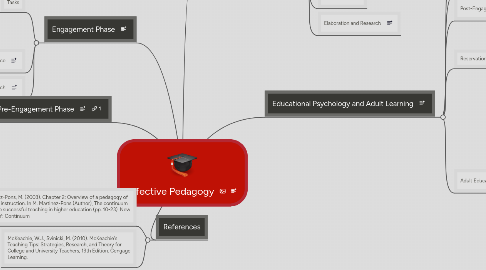
1. Engagement Phase
1.1. Tasks
1.1.1. Situational Assessment
1.1.2. Module implementation
1.1.3. Formative evaluation
1.1.4. Crisis intervention
1.2. Relevance
1.3. Elaboration and Research
2. Pre-Engagement Phase
2.1. Tasks
2.1.1. Needs Assessment
2.1.2. Diagnostic Activities
2.1.3. Development of instructional objectives
2.1.4. Instructional module development
2.2. Relevance
2.3. Elaboration and Research
3. References
3.1. Martinez-Pons, M. (2003). Chapter 2: Overview of a pedagogy of college instruction. In M. Martinez-Pons (Author), The continuum guide to successful teaching in higher education (pp. 10-23). New York, NY: Continuum
3.2. McKeachie, W.J., Svinicki, M. (2010). McKeachie's Teaching Tips: Strategies, Research, and Theory for College and University Teachers, 13th Edition. Cengage Learning.
4. Post-Engagement Phase
4.1. Tasks
4.1.1. Summative evaluation
4.1.2. Student remediation
4.1.3. Methodological revisions
4.2. Relevance
4.3. Elaboration and Research
5. Educational Psychology and Adult Learning
5.1. Pre-Engagement Phase
5.2. Engagement Phase
5.3. Post-Engagement Phase
5.4. Reservations
5.4.1. Theory building
5.4.2. Emphasis on child development
5.4.3. Scientific approach overlooks certain aspects of instruction
5.5. Adult Education Theory
5.5.1. Andragogy
5.5.1.1. Instructional objectives based on needs and interests.
5.5.1.2. Instructor and student work together to identify content, procedures, and resources in pursuit of instructional objectives.
5.5.1.3. Continual evaluation and modification of instructional procedures.
5.5.1.4. Reservations
5.5.1.4.1. Informal environments outside the college setting
5.5.1.4.2. Conceptualization of pedagogy
5.5.1.4.3. Dichotomy between pedagogy and andragogy

